How to discipline a (your / my) child (that won’t listen) (effective ways) | How to discipline a child without yelling or hitting | How to discipline a child without (beating) being abusive
Hello friends, how are you doing today? Welcome to #Relationships-Parenting website / blog.
Let you and your well-wishers live a happy and prosperous life through out your life term.
In this website / blog, you will always learn about #Relationships #Parenting.
Also subscribe / follow to our various social media networks from here to learn more about #Relationships #Parenting:
Just before going to “How to discipline a (your / my) child (that won’t listen) (effective ways) | How to discipline a child without yelling or hitting | How to discipline a child without (beating) being abusive“, let us know a brief, basic and very important information.
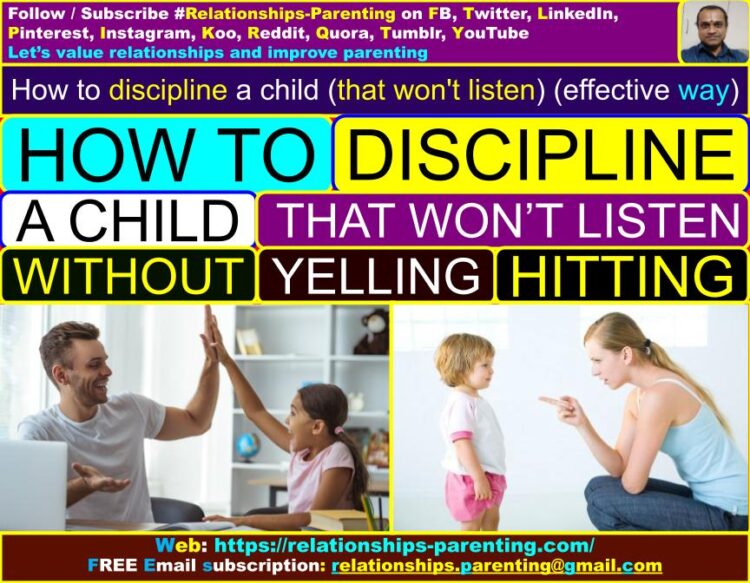
Child (Children) meaning : A child or children is a human being between the stages of birth and adulthood or between the developmental period of infancy and adulthood.
The legal definition of a child generally refers to a minor or juvenile, otherwise known as a person under the age of majority.
Discipline meaning : Discipline is the quality of behaving and working in a controlled manner that involves following certain rules or standards inside and outside the home. Synonyms of discipline: self-control, control, restraint, self-discipline etc.
Discipline at school (disciplined student) meaning : A disciplined student means he/she studies as per the school or college curriculum and follows the rules and regulations, values and cultural norms of the school or college.
Thus, when someone talks about the importance of discipline in a student’s life, that means a student who works with an expected balance and set of morals and values.
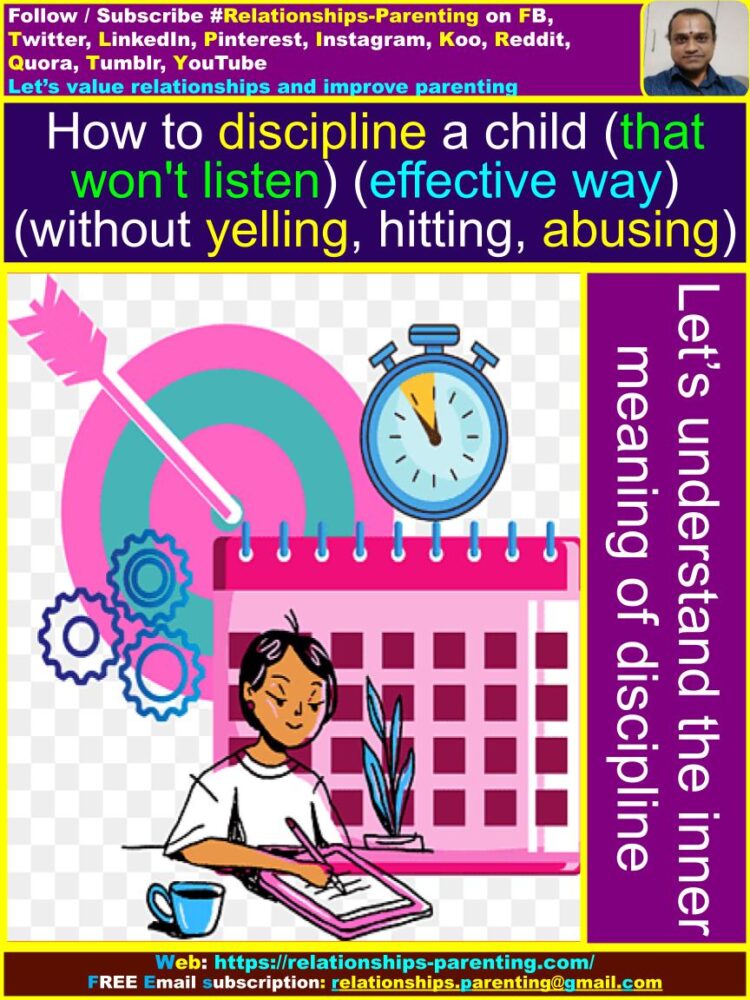
Discipline at home meaning : Discipline at home is the concept of teaching your child the difference between right and wrong and providing guidelines on how to behave at home and outside.
For example, if you want your child to stop writing on the walls, you can tell them to stop or else you can end their playtime or won’t allow them to watch TV. This provides them with a warning and an opportunity to change their behavior.
Dear parents, caretakers, guardians and other family members, every child on this earth is unique and he/she makes many mistakes in childhood.
They are called children because they make more and more mistakes, otherwise you wouldn’t call them children, would you? 🙂
Imagine your own childhood or the childhood you have witnessed such as your neighbors, relatives, friends, own family members etc. Everyone makes mistakes and mischievous things.
Here you as a parent or an elderly family member have to play a very important role to correct it without being harsh or scolding or beating or abusing or hitting etc. 99.99% of children make many mistakes.
Please take a deep breath and stay calm. Please remember that your child is still immature and needs to learn from his/her mistakes. You should absolutely avoid nagging or scolding or shouting at your child.
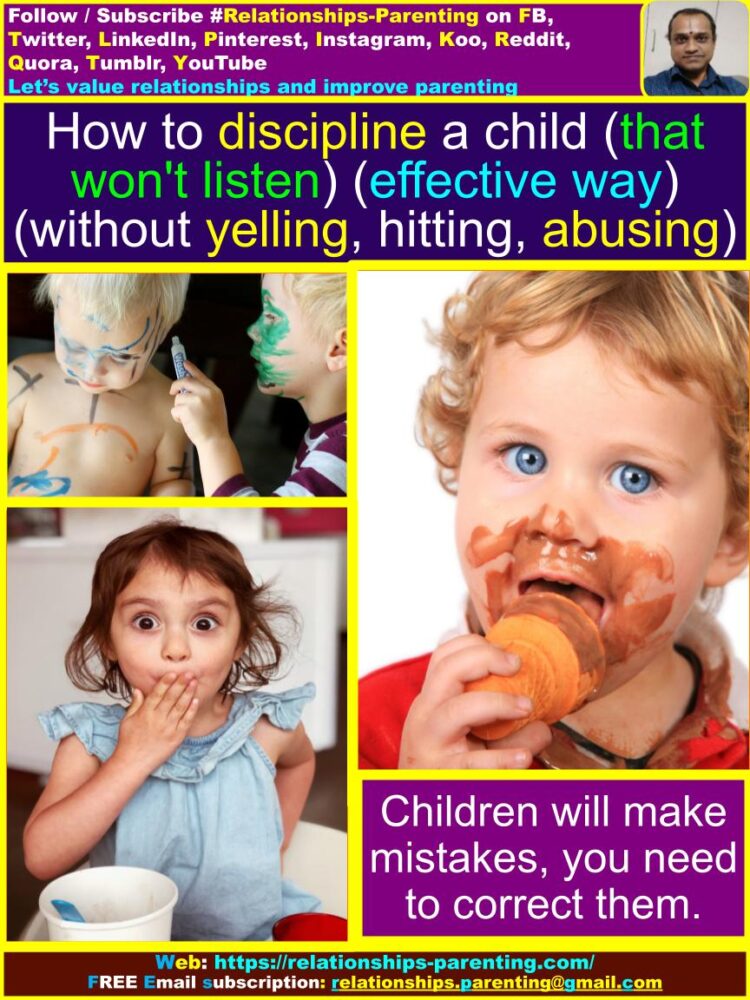
These are still learning days for them, so keep your cool and start evaluating how to correct your child’s mistakes. In this post (article), you will find different methods of assessing and fixing different errors and mistakes of a child.
If you follow all the tips in this post (article) you will be able to be a much better parent or caretaker or guardian than you are now.
Please remember, as a parent you should correct and discipline your child’s mistakes and not hit or yell at them.
List of about “How to discipline a child (that won’t listen) (effective way) | How to discipline a child without yelling or hitting | How to discipline a child without (beating / spanking) being abusive” is as given below:
Take a deep breath : When you see your child misbehaving and is going out of your control, 👿 take a deep breath. Deep abdominal breathing promotes complete oxygen exchange in your body, meaning, the more oxygen you get, the more relaxed you will be.
Not surprisingly, it slows your heart rate, cools your mind like a cucumber and makes you think about what to do before taking drastic action against your child.
Taking deep breaths stimulates your parasympathetic nervous system and helps you begin to calm down. You feel better and your ability to think rationally returns.
Your child’s mistakes can provide opportunities for parents to learn, improve, and make their children understand that no one on this earth is perfect.
Mistakes provide opportunities for parents to show their children positive ways to correct them. Accept mistakes and try to correct them and not yell at them.
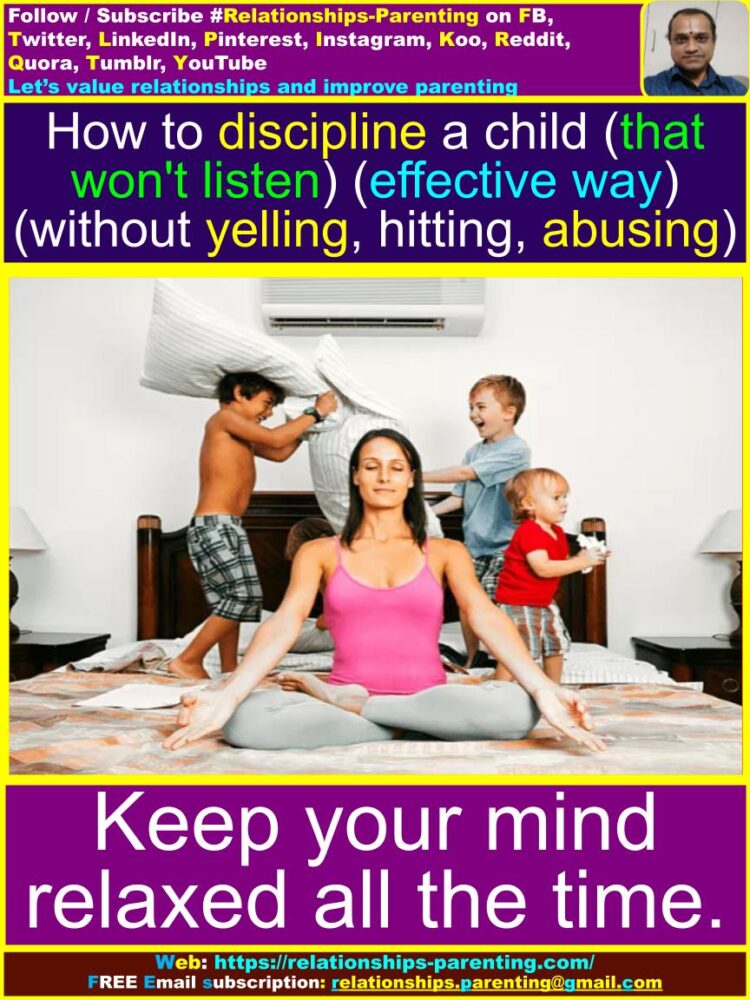
Explain to them about the mistake : Parents and other adults in the family can help children learn how to approach their mistakes constructively by modeling their behavior.
Talking openly about your child’s mistakes may be challenging at first. But doing so regularly teaches children something to learn from hiding mistakes or being irresponsible.
Many young children when they feel hungry, tired, or sick, misbehavior is more likely to occur. At this age they are not very good at communicating what they want.
As a result, they often use their behavior to show that they have unmet needs. Parents and other adults can help prevent behavior problems by looking for unmet needs.
When the unacceptable behavior persists, tell the child that the behavior is unacceptable and warn them that if the behavior does not stop you will not allow them to eat ice cream or watch TV etc.
Keep your cool and don’t get angry, but tell them about this with strict words, but keeping your mind calm, without acting harshly.
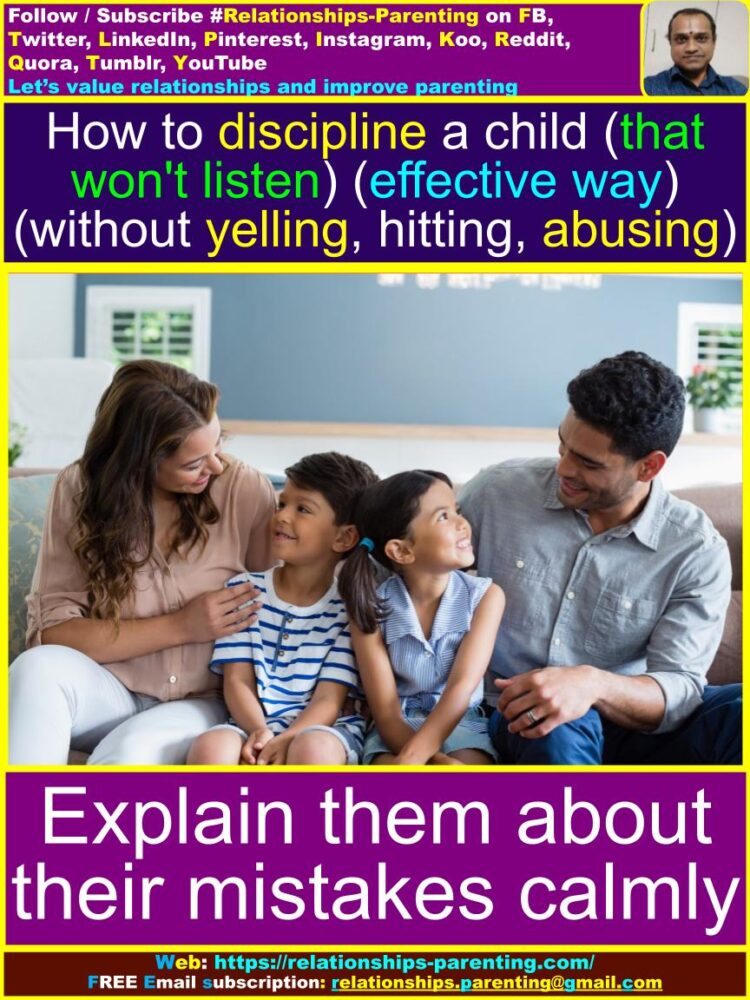
Praise their positive qualities : Praise nurtures your child’s overall confidence and sense of self. By using praise worthy words, you show your child how to think, act, and talk positively about themselves and others.
You are helping your child learn how to recognize and be proud of themselves when they are doing well and not making any mischievous things. You can praise children of different ages for different things.
If your child is very young (< 5 years), you can say that he/she is the best baby and you can give him/her a kiss. If the child is > 5 and < 8 years, you can give them a flying kiss. If they are > 8 and < 12, you can tell them by touching their cheeks. If they are > 12, you can tap them on the shoulder and tell them.
Tell them that if they are good children, they will receive more and more such praises in the future. But, make sure you are not just acting to compliment them.
Appreciate them if and only if they do something genuinely good that is truly commendable. If you give puffery or exaggerated or inflated praise, it gives your child a sense of entitlement as they become accustomed to this flattering and false view of themselves.
They believe they are exceptional and expect others to reinforce this view. Bad praise feeds growing narcissism. This can be a self-inflating assumption.
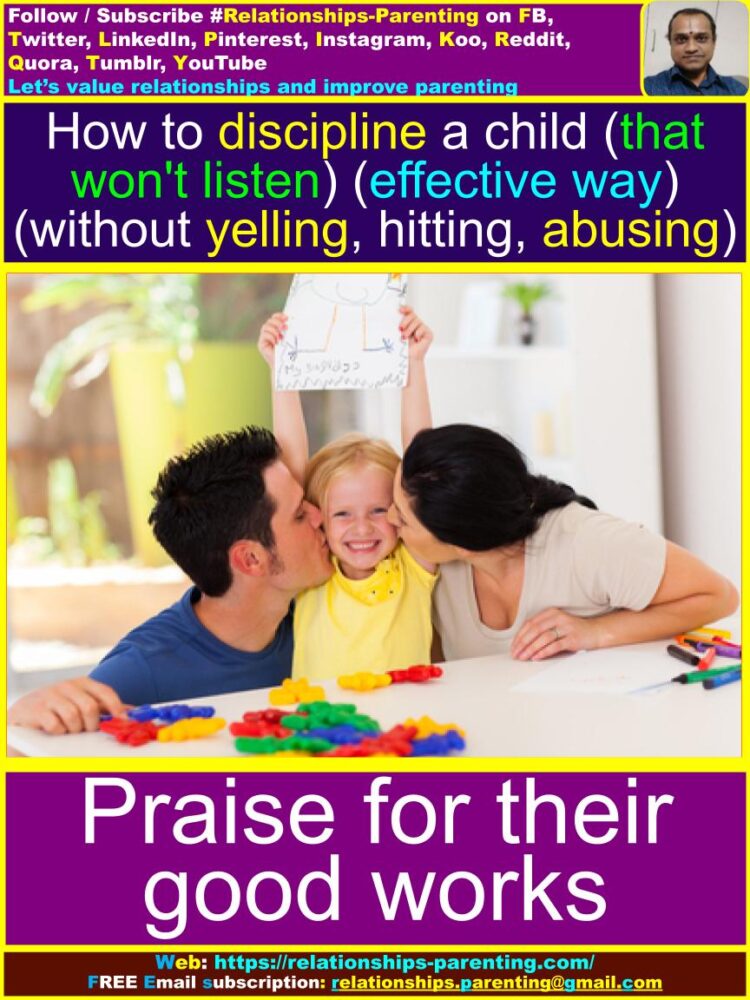
Tell them about the consequences : Your child is more likely to repeat the behavior when you use positive consequences. While negative consequences let your child know that you (parent) don’t like what your child did last time.
Your child is less likely to repeat the behavior when you use negative consequences. Negative consequences are also called discipline. Sometimes a negative attitude can be rooted in a child’s innate nature.
Some children go easily, while others have a hard time adjusting to the change. Some are aggressive and dominant while others are quiet and more introverted.
You can tell your child something like this: “I want to take you to the store today, but remember the last time you ran around the store and didn’t listen to me at all. Well, I’m not ready for that today. You have to stay at home today because of this reason. If you become a good boy/girl, I’ll take you with me next time.”
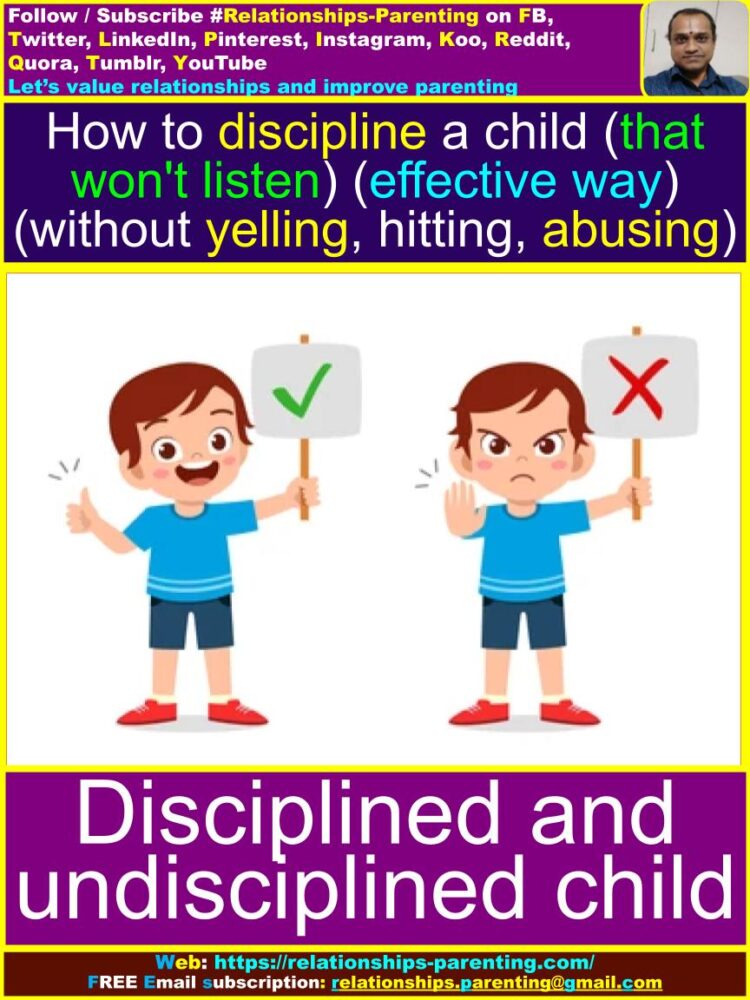
Keep them busy : Keeping your child busy keep them healthy, sharp and growing (physically and mentally). For example, choose activities as per their age and capability that will keep them busy and successful.
An activity that is too easy may bore them, while one that is too difficult may discourage them. Often children develop social skills and opportunities when they are busy. They learn sportsmanship, self-discipline and conflict resolution.
Most of all, they have fun! The key is to keep them that way and ensure that kids and parents don’t get overwhelmed, but at the same time the kids have an entertaining and learning experience.
Some of the indoor examples are: Drawing and painting, clay modeling, papercraft and origami, beadwork, basket weaving, sewing and knitting, and woodworking. Arts and crafts nurture your child’s creativity and help them focus.
Few of the outdoor examples are: Tag, Hopscotch, Kick the can, Capture the flag, Four square, Red Rover, Sack race, Duck-duck-goose, Musical chairs, Matching game, Kan-Jam, Twister, Cornhole, Ladder toss etc. (Or choose according to your country and child’s interest).
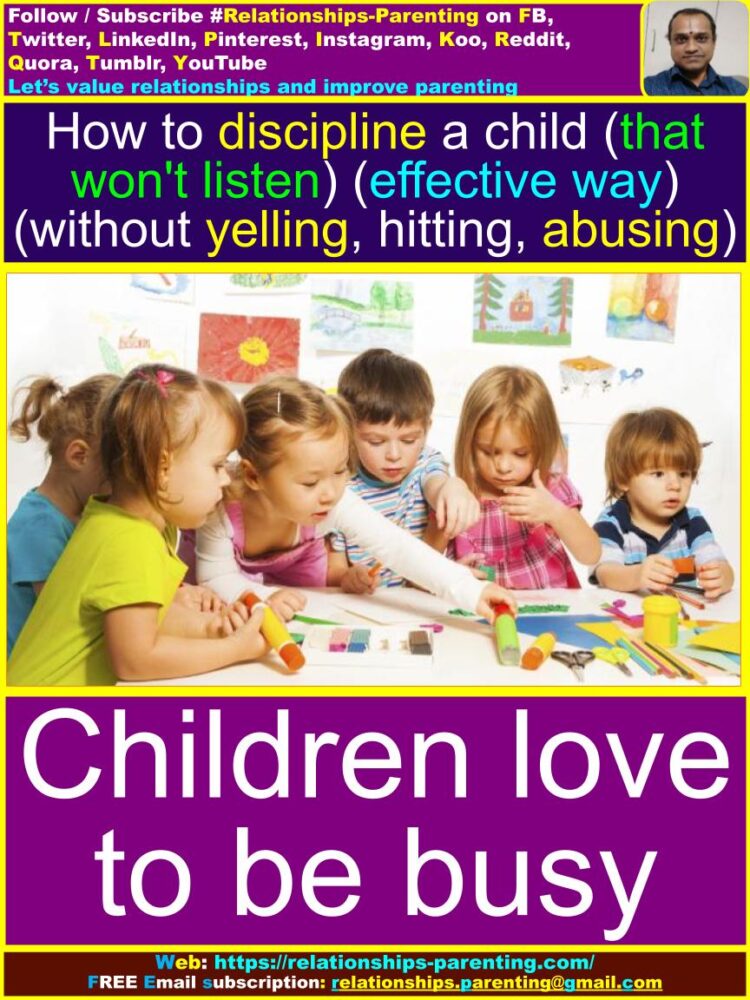
Listen to them : By actively listening to your child, you show them what they are saying to you, which boosts your child’s confidence, develops their trust, they feel valued and helps your child build stronger bonds with you, today and tomorrow.
Your attentive listening provides your child with an extraordinary path to develop positive social relationships. They learn the value of conversation and how good it is to listen.
Listening without judgment shows the child you care about them and allows a safe, authentic, space for honest connection and exchange between you and your child.
On the contrary, children who are not heard may never listen to others. There is always the impression that they are unworthy of your time and attention. Whatever they do, think or feel is negative.
Children lose confidence and self-esteem, which is detrimental to their development. Listen to their issues, positive or negative. This will make your bond stronger and stronger.
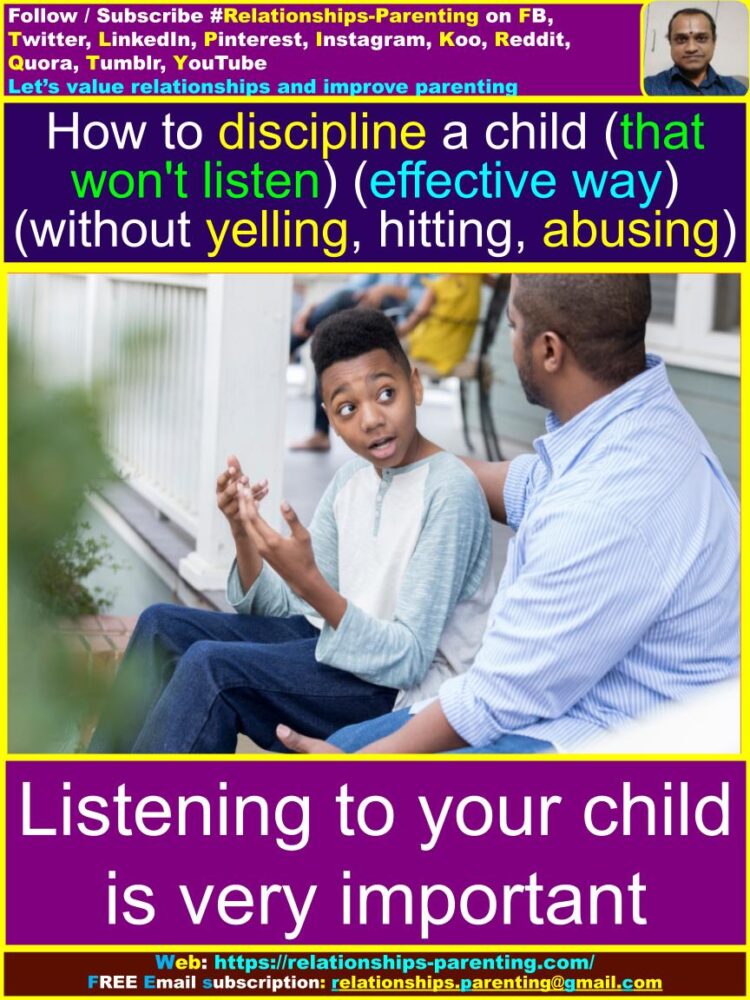
Expect trouble from them : You can expect trouble from your child or children at any time. As mentioned earlier, they are still growing and you need to take care of your sapling (child) daily.
If you don’t take care of your sapling (child) daily, it can be harmful for both of you. Just as you take care of a sapling daily and regularly, you should take care of your children daily and regularly.
You are not sure when the branches of the saplings may bend. As soon as your sapling bends, you should straighten it. Likewise, you need to expect trouble from your child too.
As soon as you see an old or new problem with your child, you should be the first person to address the problem quickly.
If you don’t deal with that problem with your child, tomorrow that problem can become bigger and cause problems for you and your child. No matter how BIG or small the problem may be, you need to address it daily and regularly and quickly too.
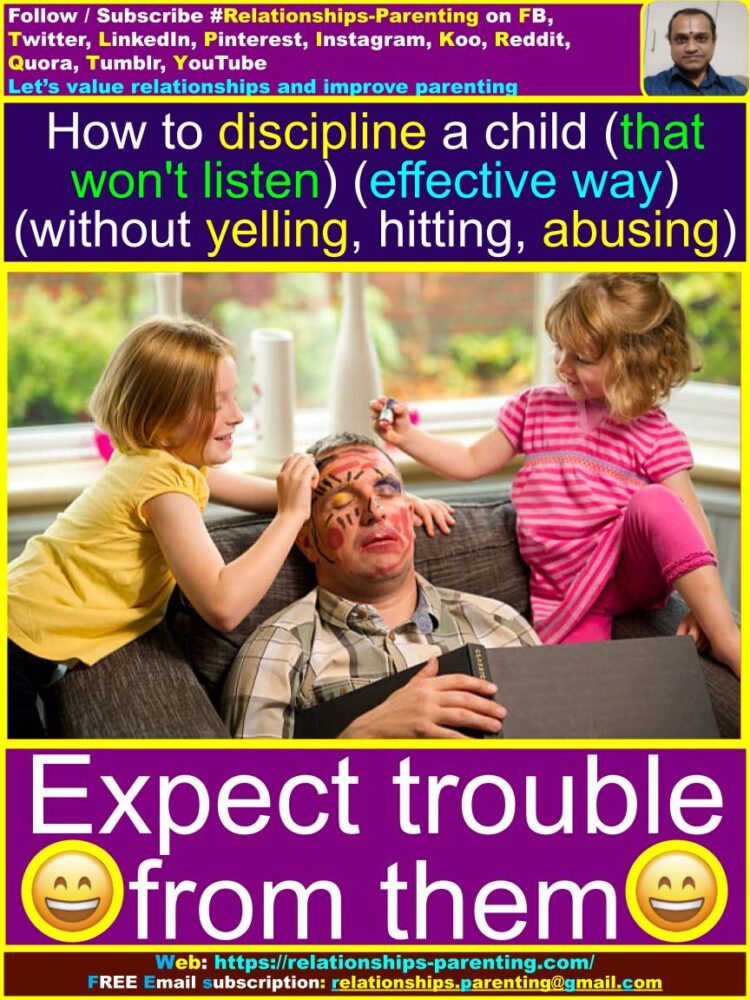
Redirect bad behavior : Few times kids misbehave because they don’t know what to do or are bored. Find something good for your child to do.
Redirecting is a technique parents can use to help children understand appropriate behavior and how to manage their behavior at the right time.
Redirection is used to encourage desirable behavior, prevent any physical injury, minimize punishment, and encourage learning and exploration.
Redirection is a proactive teaching strategy used to address challenging behavior (something that interferes with learning and engaging in social interaction) before it escalates or persists.
Redirecting interrupts and modifies the child’s behavior or calms them down to avoid conflict. With redirection, the parent is still in control, as is the child. This makes the child feel more secure, valued, making the negative behavior less likely to continue.
Some examples of redirecting a child are: (a) If the child is running fast in the park, you can say, “Now it’s time to slow down.” Then, hold their hand and help them walk.
(b) If the child hits the toy, you can say, “The toy is there to play with and not to fight with,” and then demonstrate how to gently play with the toy. (c) If the child is biting something, you can say, “That thing is not there for biting, instead bite this biscuit”.
(d) If the child is climbing on the furniture, you can say, “It is unsafe to climb on the furniture. Let’s go to park and climb on the playground.” This shows them an alternative behavior that is more suitable for them.
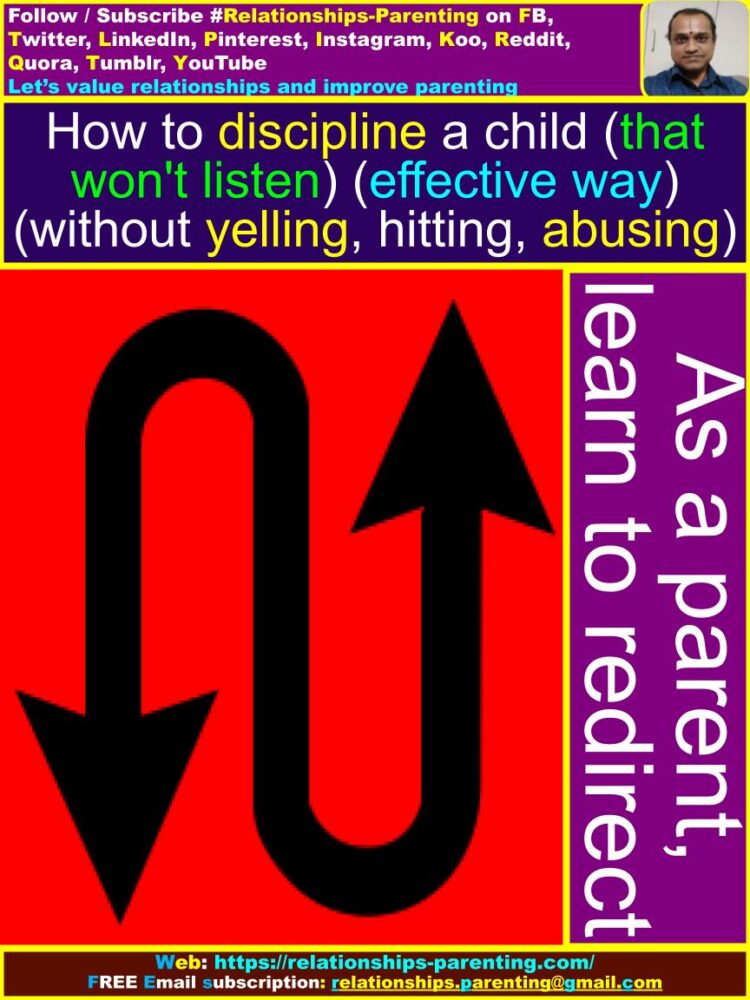
Appreciate their good works : Appreciating is when you tell your child that you like all the good things they are doing in the right way or how well they are behaving.
For example, if your child has completely eaten his breakfast you can say ‘Good job, John’, ‘Well done, Nikita’ or ‘That’s great, Sam’. Appreciating nurtures your child’s confidence and sense of self.
By using words of appreciation, you show your child how to think positively and talk positively about themselves and others. Appreciating can encourage your child’s good behaviors.
The way you react after your child’s behavior makes the behavior more or less likely to happen again. On the one hand, your words of appreciation can help your child do more of the things you want them to do.
On the other hand, if you appreciate them for their false deeds or wrong words, they will start thinking that whatever they are doing is right even if they are lying or untruthful. Be careful before using the words of appreciation.
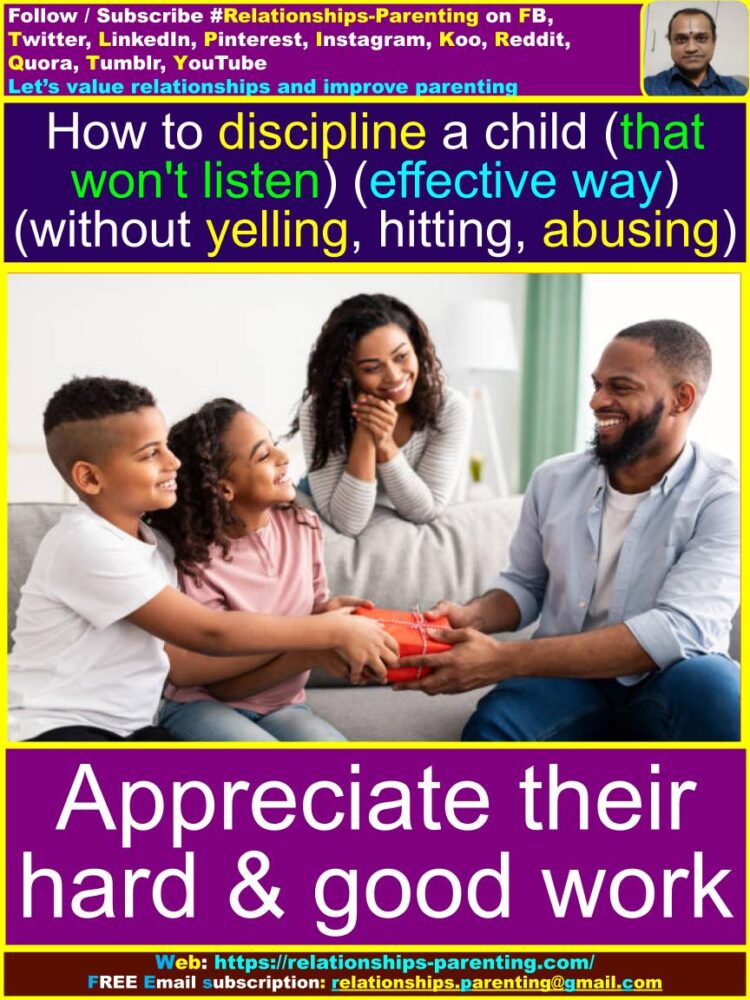
Give smart goals to them : In today’s modern world it is essential to set smart goals for your child according to their age and ability as it helps to build confidence in them and their capabilities.
Because children feel more confident and valued when they get closer to achieving the goals set, when they realize they can achieve something they set out to do.
Benefits of goal setting include: It teaches your child about goals. It teaches children planning skills. It creates a blueprint for meeting goals and working toward them teaches children to persevere today and tomorrow (their future).
While goal setting can begin with children as young as 3 or 4, it is important to adjust the approach based on the child’s age. At any age, start the conversation by asking children what they want to do today or this week or month or year.
Start with small goals and as they go through each goal, after a while start giving them a little more difficult goals. Similarly, increase the quantity and quality of goals according to their age and ability.
This ensures that they will definitely achieve more targets in their life when they start thinking and working independently.
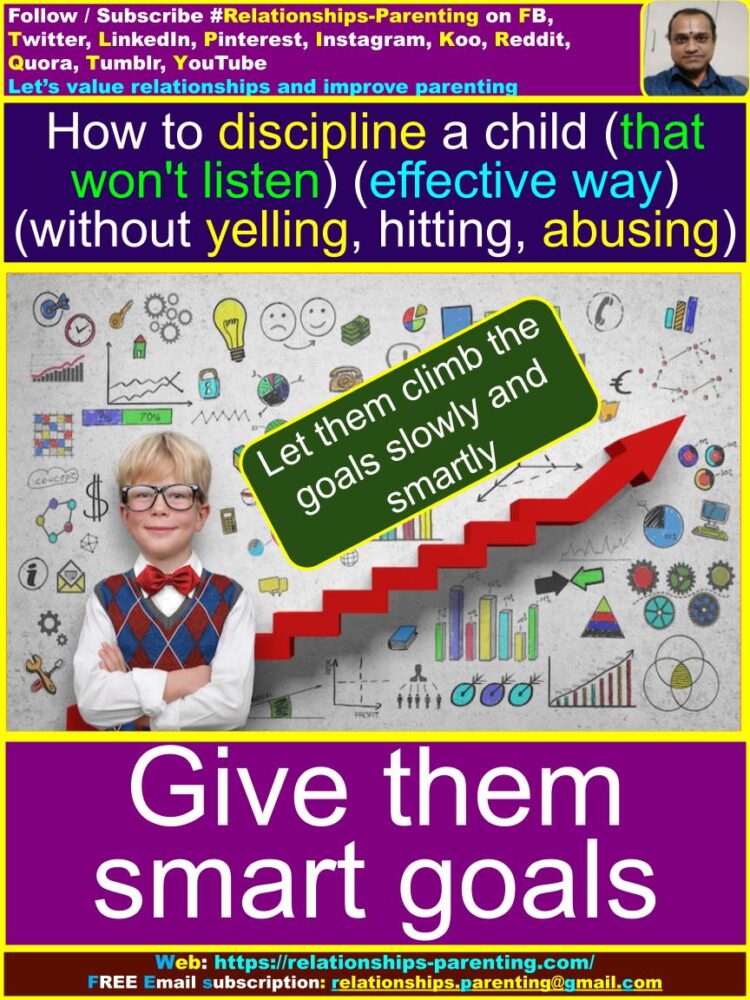
Minimize the use of gadgets : Yes of course in today’s modern world gadgets like smart phone, smart TV, digital world etc. have become a part of our life. But, that is not our life. They cannot give us real happiness, they are short-lived.
For example, a reel or short on social media can go viral within a short period of time. The same video doesn’t go viral for whole month or year.
Likewise, all these gadgets are good enough to some extent, but then it is our family, friends, relatives, neighbors and of course God who saves us from our difficult times and situations and not these so-called modern gadgets.
Many studies have shown that 1 hour or less of screen time for children under 5 years old. Children over the age of 5 may have little more screen time. However, there should always be a limit.
As a good and matured parent you should set aside a certain amount of time for them to be exposed to screens apart from educational purposes.
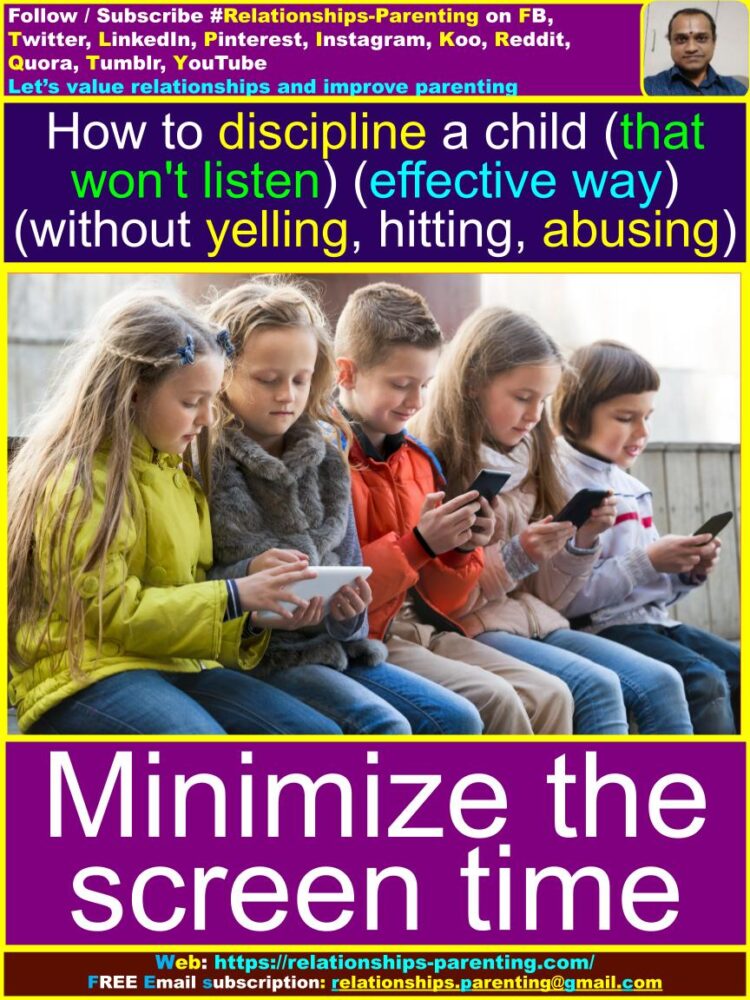
You be a role model : A child’s relationship with their parent or caregiver is one of the most important they have in their life. As a parent or caretaker, you are your child’s first teacher and your actions speak louder than the words you use.
You should be aware of your body language in front of your child. Children are very intelligent and are always paying close attention to both your physical body language and the words you use in front of them.
You should be more careful about yourself when your children are around you. Show your children how to follow your own rules inside and outside your home, and model them every chance you get.
Similarly, use discipline to teach life skills and explain how these rules will help them later in life. If you show your children that you respect your own rules, it will increase the effectiveness of your discipline strategies and your children will also start to follow their rules.
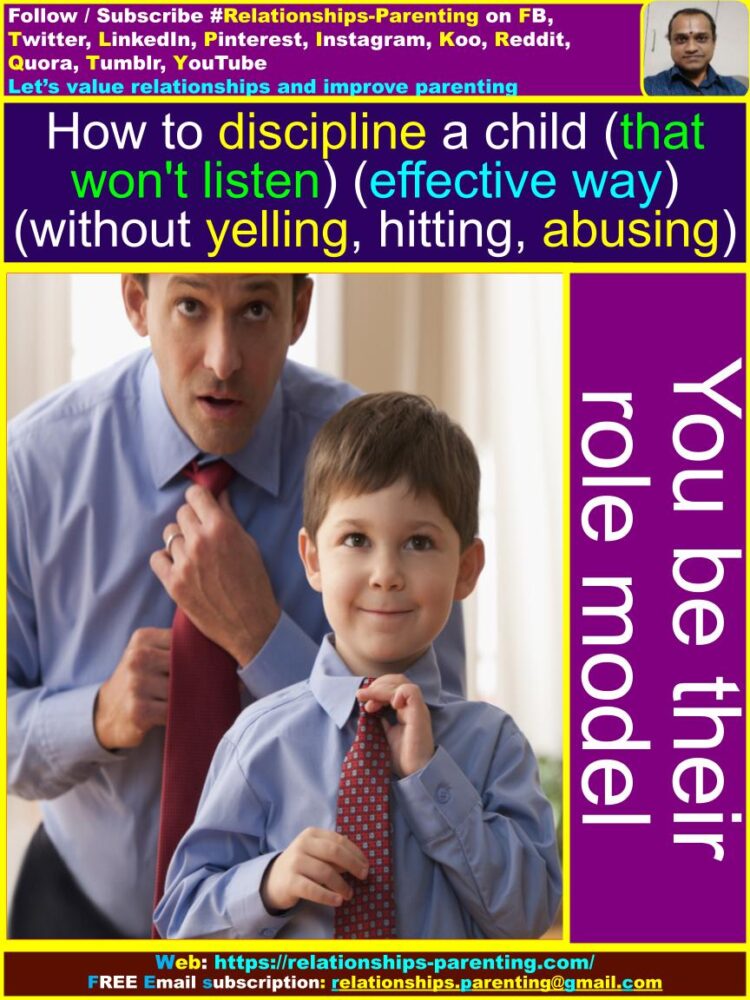
More information will be added to this on regular basis. Please visit this post and blog / website to know more about relationship and parenting.
Continue reading about:
To know more about “Husband and wife information, facts“, please click the below link:
Husband and wife information, facts
Dear friends, if you need any clarifications about this post, kindly let me know, I will definitely try to answer all of them.
Also add your COMMENT below, SHARE on different SOCIAL MEDIA networks.
This will help to know the quality of this content and also it will be helpful to know if any improvements is required for the content.
If you feel this content is useful to you and has helped you to improve your knowledge, kindly share this with your well-wishers.
Because “SHARING MEANS CARING”.
To receive FREE EMAIL SUBSCRIPTION about #Relationship #Parenting, you can send an email to [email protected] from your email ID.
Let you and your well-wishers live a prosperous, healthy and fearless life through out your life term.